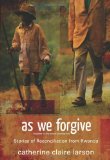
 As We Forgive
As We ForgiveStories of Reconciliation from Rwanda
Review posted March 13, 2011.
Zondervan, 2009. 284 pages.
Starred Review
This powerful and moving book tells the stories of seven survivors of the Rwandan genocide, and their difficult journeys to forgiveness and reconciliation.
Each story is heart-wrenching. But each survivor was able to rise above the horrendous things they experienced. That any one of these people is able to forgive is mind-blowing. Taken together, the book clearly makes the case that the path to healing lies in forgiveness.
And you won't be ever be able to look at people who've wronged you as harshly again. If these survivors, whose families were killed, often before their eyes, can forgive and find healing, well, what has anyone ever done to me that even comes close?
And this book even tells stories of survivors who reach out in reconciliation to the one who harmed them, as they begin to put their nation back together again.
I like Appendix 2 at the back. It lists "Choices on the Way to Peace" for both the Victim and the Offender. Here's the list for the Victim:
Steps to Forgiveness:
Step 1
– I face my truth.
– I move from denial to grieving the loss.
– I open my wounds and begin to heal my pain and shame.
– I forgive myself and cease blaming.
– I accept God’s forgiveness.
Step 2
The first hand of forgiveness …
I let go of my bitterness and the right to revenge.
Step 3
The second hand of forgiveness …
I confront the offender with a request to uphold my dignity by restoring something of what was lost.
Step 4
I become open to accepting the humanity and dignity of the offender — and even the possibility of restoring the relationship.
I especially like Step 3, because when you think of forgiveness, you don't necessarily think of asking for restitution. But this list affirms that asking for some restitution is part of the forgiveness process. It’s not revenge — it’s just asking the offender to take some responsibility to help make things right.
The steps don’t talk about what happens if the offender won’t respond to the request, but the book did. The victim CAN forgive and still seek justice in court. The victim is upholding their own dignity by asking for some restitution, whether that restitution is granted or not.
The steps do make it pretty clear that reconciliation is not going to happen if the offender doesn’t respond to that request. (And the four steps for the offender are necessary, too.) But if the victim has already let go of bitterness, their own life will be transformed in a beautiful way, regardless of how the offender responds.
This is a beautiful book about forgiveness played out in actual human lives.
